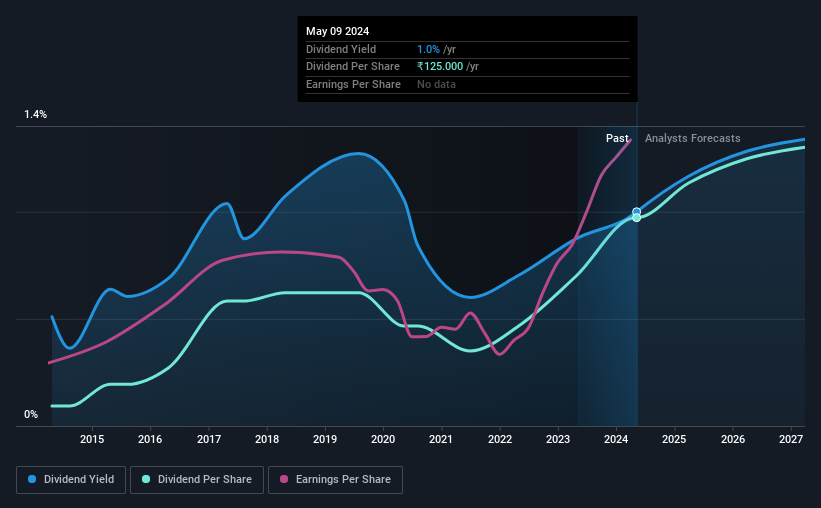Maruti Suzuki India (NSE:MARUTI) Is Increasing Its Dividend To ₹125.00

Maruti Suzuki India Limited (NSE:MARUTI) will increase its dividend from last year's comparable payment on the 3rd of September to ₹125.00. This takes the annual payment to 1.0% of the current stock price, which is about average for the industry.
View our latest analysis for Maruti Suzuki India
Maruti Suzuki India's Payment Has Solid Earnings Coverage
Unless the payments are sustainable, the dividend yield doesn't mean too much. However, prior to this announcement, Maruti Suzuki India's dividend was comfortably covered by both cash flow and earnings. As a result, a large proportion of what it earned was being reinvested back into the business.
The next year is set to see EPS grow by 29.4%. If the dividend continues on this path, the payout ratio could be 25% by next year, which we think can be pretty sustainable going forward.

Dividend Volatility
Although the company has a long dividend history, it has been cut at least once in the last 10 years. Since 2014, the annual payment back then was ₹12.00, compared to the most recent full-year payment of ₹125.00. This means that it has been growing its distributions at 26% per annum over that time. Maruti Suzuki India has grown distributions at a rapid rate despite cutting the dividend at least once in the past. Companies that cut once often cut again, so we would be cautious about buying this stock solely for the dividend income.
The Dividend Looks Likely To Grow
Given that the dividend has been cut in the past, we need to check if earnings are growing and if that might lead to stronger dividends in the future. We are encouraged to see that Maruti Suzuki India has grown earnings per share at 11% per year over the past five years. Growth in EPS bodes well for the dividend, as does the low payout ratio that the company is currently reporting.
We Really Like Maruti Suzuki India's Dividend
Overall, a dividend increase is always good, and we think that Maruti Suzuki India is a strong income stock thanks to its track record and growing earnings. The company is easily earning enough to cover its dividend payments and it is great to see that these earnings are being translated into cash flow. All in all, this checks a lot of the boxes we look for when choosing an income stock.
It's important to note that companies having a consistent dividend policy will generate greater investor confidence than those having an erratic one. However, there are other things to consider for investors when analysing stock performance. Taking the debate a bit further, we've identified 2 warning signs for Maruti Suzuki India that investors need to be conscious of moving forward. Is Maruti Suzuki India not quite the opportunity you were looking for? Why not check out our selection of top dividend stocks.
New: Manage All Your Stock Portfolios in One Place
We've created the ultimate portfolio companion for stock investors, and it's free.
• Connect an unlimited number of Portfolios and see your total in one currency
• Be alerted to new Warning Signs or Risks via email or mobile
• Track the Fair Value of your stocks
Have feedback on this article? Concerned about the content? Get in touch with us directly. Alternatively, email editorial-team (at) simplywallst.com.
This article by Simply Wall St is general in nature. We provide commentary based on historical data and analyst forecasts only using an unbiased methodology and our articles are not intended to be financial advice. It does not constitute a recommendation to buy or sell any stock, and does not take account of your objectives, or your financial situation. We aim to bring you long-term focused analysis driven by fundamental data. Note that our analysis may not factor in the latest price-sensitive company announcements or qualitative material. Simply Wall St has no position in any stocks mentioned.
About NSEI:MARUTI
Maruti Suzuki India
Engages in the manufacture, purchase, and sale of motor vehicles, components, and spare parts primarily in India.
Excellent balance sheet average dividend payer.
Similar Companies
Market Insights
Community Narratives



